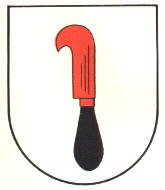Eisental: Difference between revisions
Jump to navigation
Jump to search
Knorrepoes (talk | contribs) m (Text replacement - "===Official blazon=== *(de) " to "{| class="wikitable" |+Official blazon |- |'''German''' | ") |
Knorrepoes (talk | contribs) m (Text replacement - ". ===Origin/meaning===" to ". |- |'''English''' | {{blazon wanted}} |} ===Origin/meaning=== ") |
||
| Line 15: | Line 15: | ||
| | | | ||
In Silber ein pfahlweis gestelltes rotes Winzermesser mit schwarzem Griff. | In Silber ein pfahlweis gestelltes rotes Winzermesser mit schwarzem Griff. | ||
|- | |||
|'''English''' | |||
| {{blazon wanted}} | |||
|} | |||
===Origin/meaning=== | ===Origin/meaning=== | ||
Eisental became a separate municipality at the end of the 18<sup>th</sup> century. The oldest, 19<sup>th</sup> century seal shows already the knife (used for cutting grapes). Later seals showed the same image, which was approved as arms in April 1900. | Eisental became a separate municipality at the end of the 18<sup>th</sup> century. The oldest, 19<sup>th</sup> century seal shows already the knife (used for cutting grapes). Later seals showed the same image, which was approved as arms in April 1900. | ||
Revision as of 07:24, 5 July 2022
This page is part of the German heraldry portal |
Heraldry of the World |
|
German heraldry:
|
Selected collector's items from Germany:
|
EISENTAL
State : Baden-Württemberg
District (Kreis) : Rastatt (until 1972 Bühl)
Incorporated into : 1972 Bühl
| German |
In Silber ein pfahlweis gestelltes rotes Winzermesser mit schwarzem Griff. |
| English | No blazon/translation known. Please click here to send your (heraldic !) blazon or translation |
Origin/meaning
Eisental became a separate municipality at the end of the 18th century. The oldest, 19th century seal shows already the knife (used for cutting grapes). Later seals showed the same image, which was approved as arms in April 1900.
Contact and Support
Partners:
Your logo here ?
Contact us
© since 1995, Heraldry of the World, Ralf Hartemink 
Index of the site
Literature : Zier, 1964.












